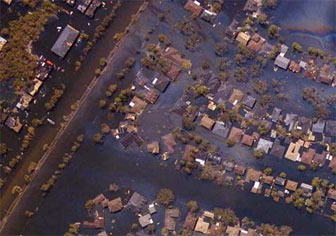Global warming will threaten health through dirtier air, hotter days, and more natural disasters
Global warming will threaten health through dirtier air, hotter days, and more natural disasters
mongabay.com
October 23, 2006
Global warming will threaten human health through dirtier air, hotter days, and more natural disasters that will worsen water quality, stress emergency systems, and create environmental refugees, warns a public health physician.
“When most people think about climate change, they think of heat stress from heat waves,” said Cindy Parker, M.D., of the Johns Hopkins Bloomberg School of Public Health. “The heat wave in Western Europe in 2003 killed in excess of 30,000 people who wouldn’t have died otherwise. With climate change, heat waves will become more severe, and last for longer periods of time.”
“Scientists (in the U.S.) haven’t done a good job of communicating why climate change is important to regular people,” said Parker, who spoke Sunday on the health hazards of global warming at the Annual Meeting of the Geological Society of America in Philadelphia.
 Flooded New Orleans neighborhood in the aftermath of Hurricane Katrina. Photo courtesy of NOAA.
|
While heat waves and infectious disease will likely worsen, said Parker, “some of the less direct impacts will be much more devastating for us.”
With predictions that climate change will bring more powerful storms, Parker said that the infrastructure for dealing with disasters may fail.
“As we saw from New Orleans, we’re not good at evacuating people during storms,” she noted. “Our biggest medical centers have been built in our larger cities… As sea level rises, there go our medical institutions, water treatment plants, emergency response units such as fire departments and ambulances. The bulk of the services designed to keep us healthy are almost all located in our larger cities, which are also located frequently at sea level.”
Further, argued Parker, climate change is threatening water supply and water quality in many areas.
“Even without climate change, water is already in short supply,” said Parker. “But under changed climate conditions, precipitation patterns are expected to change,” worsening droughts and putting food supplies at risk.
Parker says that preparation is key to minimizing the potential impact of climate change.
“These measures don’t necessarily require a lot of money and we already have the new technology,” she said. “I’m a preventive medicine physician, and I use that training and way of thinking with respect to climate change as well. It makes a whole lot more sense to me to prevent our climate from more instability rather than waiting and putting our research and resources into trying to fix problems after they’ve happened.”
This article is based on a news release from Johns Hopkins University